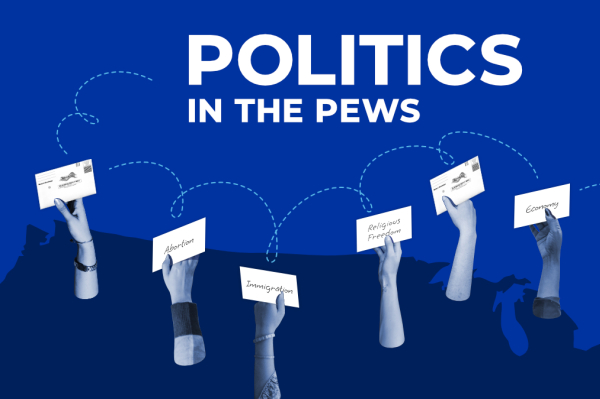Returning to the Gospels
"Public religion," Sightings' constant theme, includes "public theology." This week The Christian Century (June 12) offers a challenge on that theme from the Anglican Bishop of Durham, N. T. Wright, as noted a New Testament scholar as is being read and heard these days. The article condenses his lecture last November to the Society of Biblical literature. He always speaks and writes clearly, so it is hard to duck his point. He aims negatively at "the extraordinary inverted snobbery of preferring gnostic saying-sources to the canonical documentation" and at over-worked scholarly "source and form criticism." Taking the two together, he regards them as efforts to see the four Gospels "patronized, muzzled, dismembered and eventually eliminated altogether as a force to be reckoned with." Strong stuff. Wright is then obliged to make his positive case, which is no less likely to jolt many interests who engage in scholarship and "public theology."
Here it is: "The central message of all four canonical Gospels is that the Creator God, Israel's God, is at last reclaiming the whole world as his own, in and through Jesus of Nazareth. That, to offer a riskily broad generalization, is the message of the kingdom of God, which is Jesus' answer to the question, What would it look like if God were running this show." Which God? Not the one Nietzsche or Christopher Hitchens denounces, their "celestial tyrant" who is badly "running the world." No, "the whole point of the Gospels is that the coming of God's kingdom on earth as in heaven is precisely not the imposition of an alien and dehumanizing tyranny, bur rather the confrontation of alien and dehumanizing tyrannies with the news of a God—the God recognized in Jesus—who is radically different from them all, and whose inbreaking justice aims at rescuing and restoring genuine humanness."
I am quoting more than usual, perhaps offering something redundant to our many readers who also subscribe to The Christian Century and who may have skimmed or scanned or mentally filed "for further reflection" Wright's original. I certainly will not have space to quote sufficiently to let Wright flesh out what this all means. I hope I am tantalizing readers to track the article down and do their own arguing with it. So let me just point to a few themes that deal with "public theology." Wright is rough on those who believe there are no options between tyranny and anarchy, who confuse Enlightenment "democracy" with the kingdom of God, who split the Jesus of the gospels from the Christ announced in New Testament letters, fundamentalists who tout biblical authority but do not listen to the biblical gospels, the political left, the political right, those who are too eager to muffle the Gospel themes in the face of "pagans, ancient and modern alike" or the scandalized Jews then and now. This is not an anti-secular or anti-Semitic book, but one that clears space for the witness of the Gospels, which he sees too often softened.
Still listening to the New Testament, Wright sees it reaffirming "the God-given place even of secular rulers, even of deeply flawed ones," the only kind the early Christians met. Wright makes a main point of the fact that in the New Testament, "the church" is to call to account the earthly powers (of both and all parties!). That means taking seriously the fact that "our present glorification of democracy" is not biblically faithful. Again, not anti-democratic, Wright wants to "highlight the publicness of God and the Gospel," and to "set forward those reforms which will enable the church to play its part in holding the powers to account and thus advancing God's restorative justice."
_____________________________________________________________
Martin E. Marty's biography, current projects, upcoming events, publications, and contact information can be found at www.illuminos.com. Original Source: Sightings – A biweekly, electronic editorial published by the Marty Center at the University of Chicago Divinity School.





















